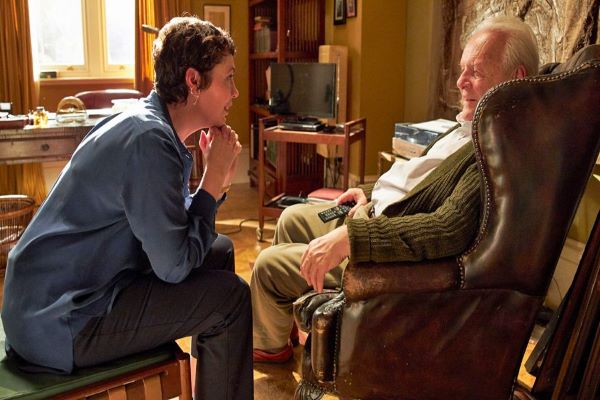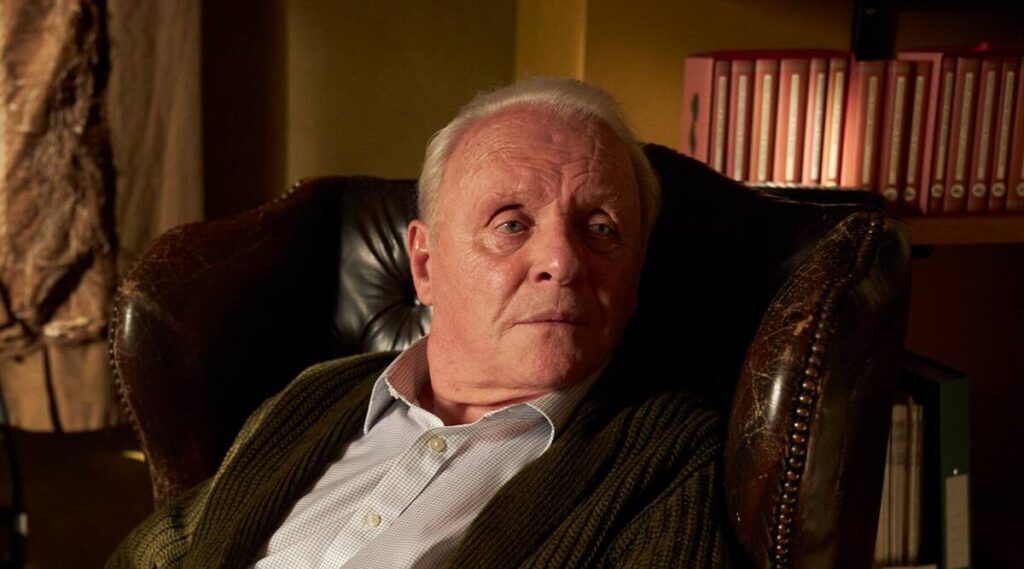Florian Zeller’s multilayered film The Father deals with the sufferings at old age due to dementia. The way he has woven the film, it does not look like his filmmaking debut. No matter how many ways viewers try to connect the dots, the film always leaves unanswered questions. The non-linear story revolves around reality and fantasy, facts and imaginations, life and dreams. The Father meticulously portrays the helplessness of old age especially when an old person suffers from horrible mental diseases like dementia. Veteran actor Anthony Hopkins touches hearts with his extraordinary acting. The Father depicts the traumatic and agonized world of a mentally challenged person.
Anne (Olivia Colman) visits her father Anthony (Anthony Hopkins) in his flat. He has been suffering from dementia and did not get along well with his previous carer Angela whom Anthony blames for stealing his watch. Anne informs him that she will move to Paris to stay with the new man in her life. Anthony can’t recall any new man other than her former husband James. She warns that Anthony will need to be shifted to a nursing home if he denies carers. The next day, Anthony sees an unknown man (Mark Gatiss) in his flat. The unknown man identifies himself as Paul and claims that it is his flat where Anthony stays with his daughter Anne and him. Anthony gets confused again when a different lady returns to his flat appearing as Anne. She schedules an interview with the new carer Laura (Imogen Poots). Anthony introduces himself as a retired tap dancer. He claims to be completely fit and does not need a carer. Laura reminds Anthony of his daughter Lucy who he has not spoken to for a long time. He does not know her whereabouts.

Laura expresses her condolences and grief for Lucy’s accident, but Anthony is not aware of that. Paul (Rufus Sewell) and Anne have an argument over the canceled Italy trip. Paul gets irritated and frustrated over Anthony’s illness and slaps him. Anthony wakes up, gets out of the flat, and visits her wounded daughter Lucy in a hospital hallway. Her face is smeared with blood. Now he wakes up in a completely different room. He sees a nurse Catherine (Olivia Williams) who earlier appeared as both Anne and Laura. She informs him that Anne has shifted to Paris and visits him there occasionally over the weekends. He sees another nurse Bill who earlier appeared as Paul. Anthony is totally confused now and starts doubting his existence. He starts cherishing the memories of his mother and behaving like a child. He says that he is losing his leaves, branches, the wind, and the rain. Catherine comforts him and assures him that she will take him to the nearby park later.
The non-linear narrative of The Father raises multiple unanswered questions. Whose flat is that in the first scene? Does Anthony live in his own flat or his daughter Anne’s flat or nursing home? Who is Paul? Why does Anne appear as a different lady? Why does the nurse Bill appear as Paul? Does Anne live in Paris or London? How can Anthony visit his wounded daughter in the hospital and wake up in a completely different room? Is Lucy dead or alive? Why does Catherine appear as Laura? The equations of the story do not match up completely no matter how many times the viewers try to connect the dots. Instead of simply depicting the facts, filmmaker Florian Zeller involves viewers to be a part of Anthony’s life that itself is fragmented without any proper structure with the descent of Dementia. The viewers take a tour of Anthony’s life and feel his miserable sufferings due to dementia.
There is no right or wrong answer for this film. The objective of the film is not to arrange the jumbled-up events in order, but to feel and realize the miseries suffered by an old person due to dementia. The Father deeply touches hearts when we connect the agonies of our own family members with the agonies of Anthony. The viewers find their beloved ones in Anthony. Mental illnesses like Dementia engulf a large proportion of the world population. We get hurt and deeply sympathize with Anthony when Paul slaps him. It is very difficult for the viewers to hold the tears. The disease is so horrible that it breaks his self-confidence and makes him vulnerable in a moment. It is heartbreaking to see how he struggles to maintain his self-esteem. The only thing mental patients need is love and care. When he starts cherishing the memories of his mother and behaving like a child, Catherine provides him motherly love and comfort. That’s the way the world and society should treat mental patients. Their lives should not be restricted to the hospital rooms but reach out to the trees, open sky, sunshine, stars, greenery, and the unhindered world outside. At the end of the day, humanity should triumph over ill-treatment.
The Father excels in all the aspects of filmmaking. The film is the cinematic version of Zeller’s famous play of the same name. He wrote the screenplay with Christopher Hampton. The screenplay is dynamic, multilayered, and filled with emotional dialogues that connect viewers worldwide. The dialogues often shift the mode from normal conversation to a thriller, from happiness to anger, from self-confidence to emotional breakdown. Zeller’s direction follows the screenplay to form a multi-dimensional film. Anthony Hopkins is extraordinary throughout the film. He converts himself from a jovial person to an angry person instantly. His brilliant acting shows how quickly a self-esteemed person breaks down due to mental illness like dementia. Overall, his sensitive acting touches hearts all over the world. All the actors played their parts well. As a caring but helpless daughter, Olivia Colman’s acting is intense.
The pieces of music composed and used in The Father are melancholy, soothing, and heartening. Ludovico Einaudi used multiple opera pieces for the film including The Pearl Fisher by Georges Bizet and King Arthur, or the British Worthy by Henry Purcell. Another important aspect of the film is the production design. Production designer Peter Francis has done an outstanding job. The film is set in a single flat. Though the architecture remains the same, the setting of the flat changes from Anthony’s flat to Anne’s flat to the nursing home. As per the setting of the flat, all other components like props, furniture, lights, wall colors, paintings, and all the other details change. With a limited budget and single set, Francis has surely done a great job. Editor Yorgos Lamprinos could match the dynamism of the screenplay, direction, and production design. He has edited the film efficiently maintaining the multiple dimensions underneath it. The Father was nominated for six Oscars at the 93rd Academy Awards where Anthony Hopkins won the Best Actor and Florian Zeller and Christopher Hampton won the Best Adapted Screenplay Oscars. It was also nominated in six categories at the 74th BAFTA Awards where Anthony Hopkins won the Best Actor in a Leading Role and Florian Zeller and Christopher Hampton won the Best Adapted Screenplay awards.
